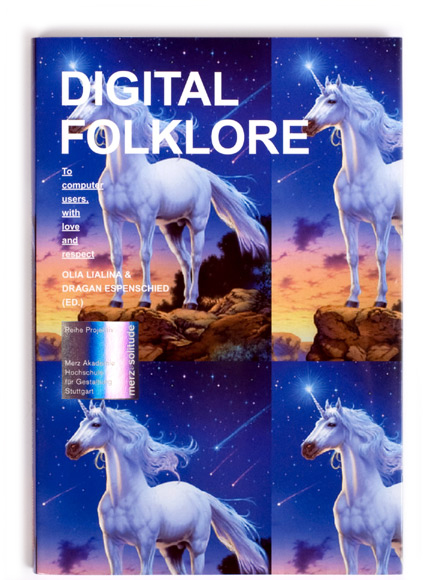Olia Lialina, Dragan Espenschied (eds.): Digital Folklore: To Computer Users, with Love and Respect (2009)
Filed under book | Tags: · amateur culture, folklore, internet, internet culture, media art, memes, net culture, network culture, web

“Technical innovations shape only a small part of computer and network culture. It doesn’t matter much who invented the microprocessor, the mouse, TCP/IP or the World Wide Web and what ideas were behind these inventions. What matters is who uses them. Only when users start to express themselves with these technical innovations do they truly become relevant to culture at large.
Users’ endeavors, like glittering star backgrounds, photos of cute kittens and rainbow gradients, are mostly derided as kitsch or in the most extreme cases, postulated as the end of culture itself. In fact this evolving vernacular, created by users for users, is the most important, beautiful and misunderstood language of new media.
As the first book of its kind, this reader contains essays and projects investigating many different facets of Digital Folklore: online amateur culture, DIY electronics, dirtstyle, typo-nihilism, memes, teapots, penis enlargement, …” (from the back cover)
Contributors: Cory Arcangel, Julia Böger, Manuel Buerger, Helene Dams, Dragan Espenschied, Jörg Frohnmayer, Mark Grimm, Christopher Heller, Yunchul Kim, Dennis Knopf, Stefan Krappitz, Florian Kröner, Tobias Leingruber, Olia Lialina, Leo Merz, Bernadette Neuroth, o+ro, johannes p osterhoff, Isabel Pettinato, Michael Ruß, Alexander Schlegel, Bert Schutzbach, Siegfried Zielinski.
Publisher Merz & Solitude (Merz Akademie & Akademie Schloss Solitude), Stuttgart, 2009
Reihe Projektiv series
Designer Manuel Buerger
ISBN 9783937982250, 3937982256
287 pages
Reviews: Pau Waelder (Furtherfield, 2010), Kevin McGarry (Rhizome, 2010), Regine Debatty (We Make Money Not Art, 2010), Alessandro Ludovico (Neural, 2010), Richard Schwarz (The Gap, 2010, DE), Marie Lechner (Libération, 2010, FR), Stefania Bercu (Masters of Media, 2010).
Book website
Publisher
WorldCat
PDF (27 MB)
Comment (0)Clemens Apprich, Felix Stalder (eds.): Vergessene Zukunft: radikale Netzkulturen in Europa (2012) [German]
Filed under book | Tags: · internet, internet culture, media culture, net criticism, net culture, network culture, networks, web

“Mitte der 1990er Jahre ist in Europa eine vielfältige Netzkultur entstanden. Während die US-amerikanische Szene den Cyberspace als Raum jenseits der Politik imaginierte, waren die europäischen Netzpioniere darauf bedacht, die Möglichkeiten des Internet für neue politische und kulturelle Initiativen in der realen Gesellschaft zu nutzen.
Anhand von Zeitdokumenten, aktuellen Textbeiträgen und Interviews geht dieser Band erstmals auf die kritische Haltung europäischer Netzkulturen ein. Die Beiträge liefern so wichtige Referenzpunkte zur Gestaltung unserer techno-kulturellen Gegenwart jenseits von Facebook und Google.”
Publisher transcript, Bielefeld, 2012
Kultur- und Medientheorie series
ISBN 9783837619065, 3837619060
348 pages
via ResearchGate
Interview with editor: Vera Tollmann (Springerin, 2013).
Reviews: Verena Pizzini (kulturrisse, 2012), Leonhard Dobusch (Netzpolitik, 2012), Werner Reiter (The Gap, 2012), Martin Schmitt (sehepunkte, 2013).
Comment (0)Gabriella Coleman: Hacker, Hoaxer, Whistleblower, Spy: The Many Faces of Anonymous (2014)
Filed under book | Tags: · activism, anonymous, anthropology, ddos, free speech, hacker culture, hacking, hacktivism, internet, internet culture, irc, lulzsec, politics, security, tactics, twitter, web, wikileaks

“A book on the worldwide movement of hackers, pranksters, and activists that operates under the non-name Anonymous.
Half a dozen years ago, anthropologist Gabriella Coleman set out to study the rise of this global phenomenon just as some of its members were turning to political protest and disruption (before Anonymous emerged as a player in the battles over WikiLeaks, the Arab Spring, and Occupy Wall Street). She ended up becoming closely connected to Anonymous and the story of her inside-outside status as Anon confidante, interpreter, and erstwhile mouthpiece forms one of the themes of this engrossing book.
The narrative brims with details unearthed from within a notoriously mysterious subculture, whose best-known tricksters – such as Topiary, tflow, Anachaos, and Sabu – emerge as complex, diverse, politically and culturally sophisticated people. Propelled by years of chats and encounters with a multitude of hackers, including imprisoned activist Jeremy Hammond and the double agent who helped put him away, Hector Monsegur, Hacker, Hoaxer, Whistleblower, Spy is filled with insights about digital activism and little understood facets of culture in the Internet age, including the history of “trolling,” the ethics and metaphysics of hacking, and the origins and manifold meanings of “the lulz.””
Publisher Verso Books, London and New York, November 2014
Creative Commons BY-NC-SA license
ISBN 1781685835, 9781781685839
452 pages
via Marcell
Reviews: Astra Taylor (Bookforum, 2014), Jamie Bartlett (Guardian, 2014), Hannah Kuchler (Financial Times, 2014), David Gilbert (IB Business Times, 2014), Haley Mlotek (National Post, 2014), Publishers Weekly (2014), Kirkus Reviews (2014), Nathalie Maréchal (Int’l J of Communication, 2015), Maxigas (Krisis, 2015).
Commentary: João Biehl & Naomi Zucker, Haidy Geismar, Adam Fish & Luca Follis, Tom Boellstorff, Gabriella Coleman (J Ethnographic Theory book symposium, 2015).
Debate with Gabriella Coleman, Cory Doctorow and James Bridle, London, 4 Nov
Comment (0)
